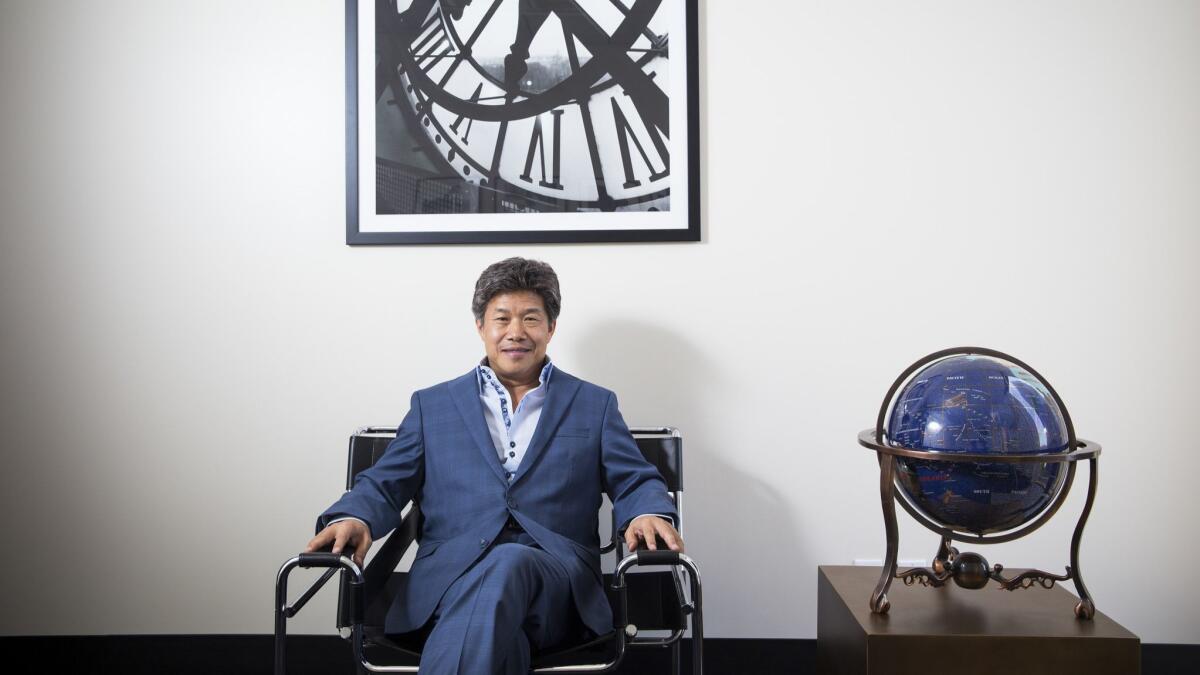Los Angeles film company Global Road Entertainment is in financial crisis after failing to raise funds

- Share via
Film company Global Road Entertainment, known for flops such as “Hotel Artemis,” is facing dire financial problems after failing to raise the needed capital to pursue its ambitious business plan to strengthen ties between Hollywood and China.
Lenders for the budding company, owned by Donald Tang’s Century City-based Tang Media Partners, have taken control of the firm’s domestic film distribution and production operations, according to a person familiar with the matter who was not authorized to comment. Staff learned of the move at a Tuesday meeting with management.
The move could prompt Global Road to file for Chapter 11 bankruptcy protection, or force the sale of assets.
The lenders did not seize Global Road’s scripted and reality television division, according to the knowledgeable person. The move was first reported by Screen Daily.
A representative for Global Road declined to comment.
Tang, a former Bear Stearns executive who promised to use his deep connections in China to broker deals and create a thriving film business, has been trying to raise capital to fund the enterprise, which launched in its current form last year. Tang promised to raise hundreds of millions of dollars on a mission to build bridges between Hollywood and the world’s second-largest film market.
He bought Open Road Films about a year ago for $28.8 million from AMC Theatres and Regal Cinemas. That deal came after he purchased IM Global, which handled foreign distribution and sales to finance independent movies. He combined the two assets, overseen by former Lionsgate executive Rob Friedman, and renamed them Global Road in October.
The company has been bruised by a series of box office flops. The misfires included family movie “Show Dogs,” romantic drama “Midnight Sun” and the Jodie Foster-starring “Hotel Artemis.” Most of the bombs were holdovers from when the company was still known as Open Road.
The firm still plans to proceed with the release of its next movie, “A.X.L.,” in nearly 1,700 theaters this weekend. The movie, about a boy who befriends an artificially intelligent robot dog, in a “Transformers”-meets-“Short Circuit” premise, is expected to open with an anemic $5 million Friday through Sunday.
Tang’s plan, backed by investors that include Chinese tech giant Tencent, was long viewed as a long shot by Hollywood insiders, who stressed that there was little audience appetite for the kinds of mid-budget movies that the company was looking to release in theaters.
He also gambled on the film business at a time when major Chinese companies had mostly stopped writing big checks to U.S. entertainment firms amid a regulatory crackdown by Beijing officials.
A U.S. citizen who was raised in Shanghai, Tang rose to prominence by growing Bear Stearns’ business in Asia. He left the firm following the 2008 financial crisis.
After leaving Bear Stearns, he helped broker high-profile entertainment deals, advising Apollo Global Management on the sale of AMC Entertainment to Dalian Wanda Group for $2.6 billion in 2012. He also helped set up a 2015 pact for China’s Huayi Brothers Media Corp. to invest in movies released by STX Entertainment. He founded Tang Media Partners in 2015.
Tang was a member of the board of the Los Angeles Times’ former parent company, Tronc Inc., until leaving in March 2017.
Twitter: @rfaughnder
More to Read
Inside the business of entertainment
The Wide Shot brings you news, analysis and insights on everything from streaming wars to production — and what it all means for the future.
You may occasionally receive promotional content from the Los Angeles Times.











